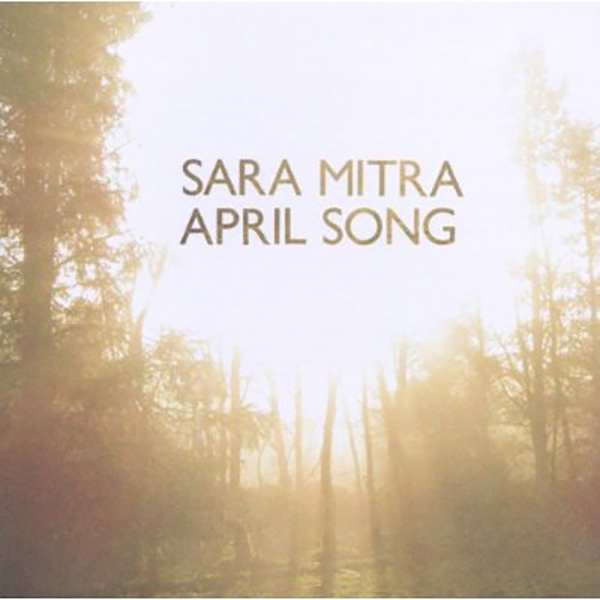
by Ian Mann
December 15, 2010
/ ALBUM
Mitra is a distinctive and very welcome new presence on the UK music scene.
Sara Mitra
“April Song”
(Impossible Ark Records)
Singer/songwriter Sara Mitra has attracted a compelling amount of critical praise for her début album “April Song”. Her own highly personalised songs sit alongside a couple of jazz and pop standards plus a version of the Irish traditional tune “Black Is The Colour”.
In addition to Mitra’s assured and emotive singing and intelligent, literate writing the success of the record also owes much to the contribution of a stellar cast of young British jazz musicians. Mitra’s husband Tim Giles is on drums with the core group also featuring Giles’ Fraud band mates James Allsopp (reeds) and Philip Hochstrate (keyboards) plus Riaan Vosloo on bass and Fulvio Sigurta on trumpet and flugel horn. There are also contributions from organist Ross Stanley and cellist Lucy Railton (of Kammer Klang fame). The core group are heavily involved in the arranging process and as a result this is a genuine jazz album with much to enjoy instrumentally as well as vocally. Listening to the music it’s easy to see why “April Song” has received such a warm welcome from the UK jazz community.
The album opens with Mitra’s “Jilted Woman Blues”, a genuine blues with a bitter lyric and a superb Giles arrangement. With regard to the latter the accompanying press release invites comparisons with the sound of Charles Mingus-fair enough I suppose but Giles and Mitra also give the tune a contemporary, Winehouse- like edge. Mitra sings with feeling and the musicianship is excellent throughout with particularly telling contributions from Allsopp, who solos powerfully, and Giles who subtly dictates proceedings from the drums.
Born and raised in Harlow, Essex to an Indian father and an Irish mother Mitra spent much of her childhood feeling like an outsider. Things are better now but much of that early hurt, anger and frustration is expressed in the lyrics of “April Song” itself. Another excellent arrangement, this time by Vosloo, features more superb ensemble playing with Hochstrate on piano as the featured soloist.
The inclusion of the traditional staple “Black Is The Colour” is, perhaps, a reference to Mitra’s Irish heritage. The arrangement here is stark, brooding and beautiful..
“Far” is less obviously autobiographical but Mitra’s lyrics are still perceptive and poetic. Another fine Vosloo arrangement incorporates Railton’s cello and an imperious solo from Allsopp on bass clarinet.
The brooding “The Choice” features grainy instrumental textures and a lyric about the nature of choice itself. It’s sombre stuff and perhaps a little too earnest- but that is quickly offset by a playful romp through Bobby Cole’s sixties hipster anthem “Life On A Look” with Sigurta’s trumpet combining well with Allsopp’s bass clarinet.
“Let Me Love You” has a more conventional “love song” lyric (albeit with something of a twist) but a far less orthodox Giles arrangement. It’s paced by Giles’ hip hop groove but also harks back to the jazz of New Orleans, an excellent mix of ancient and modern, perhaps again filtered through the prism of Charles Mingus.
Nat Adderley’s “The Old Country” is given a hugely imaginative make over with Hammond organ (which I assume to be played by guest Ross Stanley) prominent in the mix. It’s an eerie,brooding, wraith like arrangement that also gives prominence to Vosloo’s deeply resonant double bass.
Mitra’s own “Sunday Morning” is a wry look at sexual politics delivered with a knowing pop sensibility but with a Vosloo arrangement that keeps the song rooted in edgier, jazzier territory.
The two closing pieces reflect Mitra’s hard earned domestic stability. “I Will Stay With You” is a love song of sorts featuring a haunting, almost funereal arrangement with organ and other keyboard sounds prominent.
“Baby And Me” closes the album on a more optimistic note with a breezy samba beat but there are still a number of barbs hidden in the lyrics. The title may refer to Mitra’s experience of motherhood. The album was recorded with her baby daughter Eleanor present in the studio with Mitra sometimes cradling her as she sang. The experience led to her singing having a controlled, quiet intensity.
“April Song” is an impressive début from Mitra. She doesn’t have a conventionally “big” or “good” voice but her singing is perfectly suited to her own highly personalised material. She emotes convincingly but without straining, still able to communicate bitterness, pain and love through her words and music. In a world of identikit female jazz singers this album is refreshingly individualistic and Mitra’s sensuality and femininity shines through but without any hint of artistic compromise. Of course the playing and arranging skills of her crack team of accompanists is a huge help- Giles, Vosloo and their colleagues help Mitra to create a distinctive and very British soundworld. This is very much a jazz album with band and singer bringing out the best in each other.
Mitra’s work has been compared to that of Gwyneth Herbert. There are similarities in that both produce highly personal material from a uniquely female and London filtered perspective, but although quirky Mitra seems less self consciously kooky than Herbert. She probably lacks Herbert’s technical ability too (Gwyneth seems to be able to sing just about anything) but Mitra is still a distinctive and very welcome new presence on the UK music scene. Her growing reputation has led to her being scheduled to appear at the 2011 Brecon Jazz Festival.
blog comments powered by Disqus